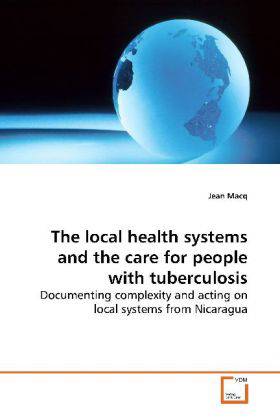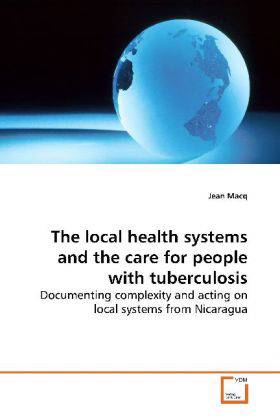
Je cadeautjes zeker op tijd in huis hebben voor de feestdagen? Kom langs in onze winkels en vind het perfecte geschenk!
- Afhalen na 1 uur in een winkel met voorraad
- Gratis thuislevering in België vanaf € 30
- Ruim aanbod met 7 miljoen producten
Je cadeautjes zeker op tijd in huis hebben voor de feestdagen? Kom langs in onze winkels en vind het perfecte geschenk!
- Afhalen na 1 uur in een winkel met voorraad
- Gratis thuislevering in België vanaf € 30
- Ruim aanbod met 7 miljoen producten
Zoeken
The local health systems and the care for people with tuberculosis
Documenting complexity and acting on local systems from Nicaragua
Jean Macq
Paperback | Engels
€ 84,45
+ 168 punten
Omschrijving
Tuberculosis control has often been managed as a
simple issue, the belief being that activities to
care for people affected by tuberculosis can be
uniformly standardized and centred on tuberculosis
diagnosis and treatment. It is undeniable that
this approach has been successful in re-organizing
unstructured national tuberculosis (TB) control
programs. Today, many countries programs are better
organized and have reached good case detection and
cure rates. There are arguments to enlarge the scope
of activities to care for people affected by TB
beyond the classical standardized strategies for
diagnostic and treatment of tuberculosis. Indeed, it
has become widely accepted that to increase further
coverage of TB diagnosis and treatment, it is
necessary to address the economic and psychosocial
problems of people affected by tuberculosis,
particularly for those having the least access to
and worse quality of care. This will be possible
only if, in addition to the current approaches,
customized care can be developed taking into account
the complex nature of care organisation as part of
local systems.
simple issue, the belief being that activities to
care for people affected by tuberculosis can be
uniformly standardized and centred on tuberculosis
diagnosis and treatment. It is undeniable that
this approach has been successful in re-organizing
unstructured national tuberculosis (TB) control
programs. Today, many countries programs are better
organized and have reached good case detection and
cure rates. There are arguments to enlarge the scope
of activities to care for people affected by TB
beyond the classical standardized strategies for
diagnostic and treatment of tuberculosis. Indeed, it
has become widely accepted that to increase further
coverage of TB diagnosis and treatment, it is
necessary to address the economic and psychosocial
problems of people affected by tuberculosis,
particularly for those having the least access to
and worse quality of care. This will be possible
only if, in addition to the current approaches,
customized care can be developed taking into account
the complex nature of care organisation as part of
local systems.
Specificaties
Betrokkenen
- Auteur(s):
- Uitgeverij:
Inhoud
- Aantal bladzijden:
- 192
- Taal:
- Engels
Eigenschappen
- Productcode (EAN):
- 9783639136630
- Verschijningsdatum:
- 10/03/2009
- Uitvoering:
- Paperback
- Afmetingen:
- 152 mm x 220 mm
- Gewicht:
- 290 g

Alleen bij Standaard Boekhandel
+ 168 punten op je klantenkaart van Standaard Boekhandel
Beoordelingen
We publiceren alleen reviews die voldoen aan de voorwaarden voor reviews. Bekijk onze voorwaarden voor reviews.









